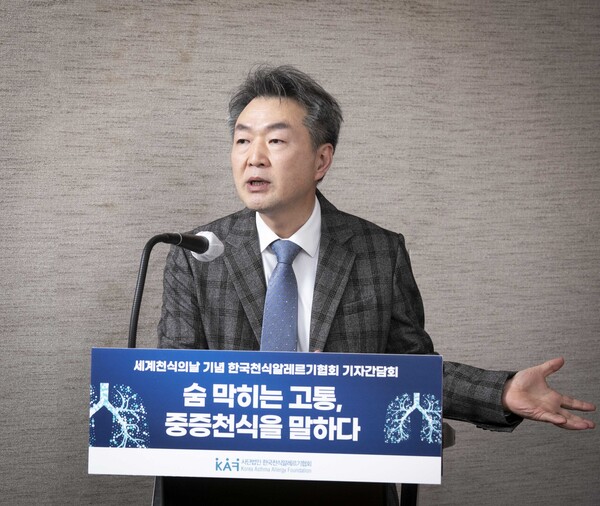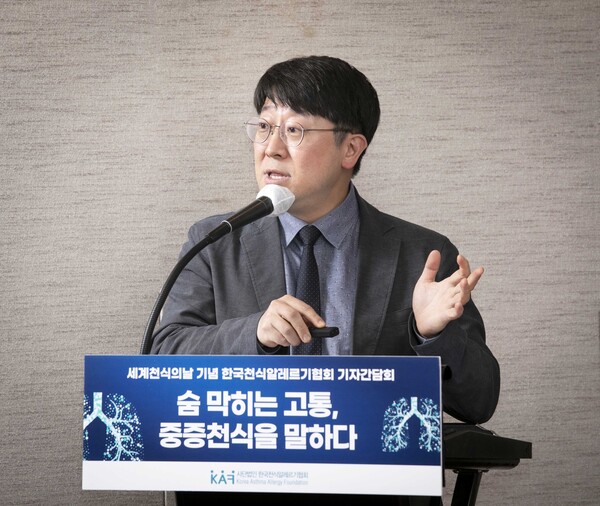Local doctors said the treatment environment for severe asthma in Korea is subpar and called for expanded reimbursement of biological treatments to improve care.

The Korean Asthma and Allergy Association held a press conference on Thursday at the Grand InterContinental Seoul Parnas ahead of World Asthma Day, which was designated by the Global Initiative for Asthma (GINA) to be on the first Tuesday of May every year to raise awareness about asthma.
"The asthma treatment environment in Korea is very poor," said the Korean Academy of Asthma, Allergy and Clinical Immunology President Jee Young-koo, during the opening remarks of the press conference. "As there is an urgent need to improve the treatment environment for severe asthma in Korea, it is necessary to fully consider the disease burden of patients and the cost-effectiveness of biologics."
According to the association, the hospitalization rate for asthma in Korea is about twice the OECD average, and the age-standardized death rate from asthma is about three to four times higher than in the U.S. and Japan.
"One in ten people with asthma will be hospitalized repeatedly due to their asthma as they are unable to keep their symptoms under control, even with the best use of inhaled medication, and they end up in the emergency room with severe shortness of breath," Jee said. "Also, due to the poor reimbursement standards, many patients with severe asthma are forced to use oral steroids, which are cheap but can cause side effects."
Jee stressed that, fortunately, in recent years, various biologics have been developed that are effective in treating severe asthma, and the World Asthma Organization and domestic guidelines have recommended that biologics be customized for patients with severe asthma.
"However, the problem is that most expensive biologics are prescribed off-label in Korea, so patients with severe asthma are not treated properly due to the burden of drug costs," the asthma association president said.

Professor Kwon Hyuk-soo at Asan Medical Center agreed.
"Studies have shown that severe asthma is associated with approximately three times as many outpatient visits and twice as many hospitalizations per year compared to moderate asthma," Kwon said. The medical expenses of severe patients are also about nine to 10 times higher, even excluding biologics, and as of 2019, the total societal cost of asthma is estimated to be 13.5 trillion won, with severe asthma accounting for 30 percent."
"Biologic treatments lack the side effects of steroids and are effective in 80 to 90 percent of patients with severe asthma," he said. "However, the problem is the biologic treatments are expensive, and it costs about 2 million won ($1,493) per month."
During the press conference, Professor Jang An-soo at Soon Chun Hyang University Hospital Bucheon also stressed the need to expand access to biologics, noting that the insurance coverage environment for biologics for severe asthma in Korea is poor compared to major countries.
"While the United States, Japan, Australia, Canada, and several European countries provide coverage for a wide range of severe asthma biologics, Korea's treatment option is limited compared to other countries," Jang said. "Patients with uncontrolled asthma have no choice but to use steroids, which carry a high risk of side effects, and long-term use of oral steroids can lead to serious side effects such as diabetes and hypertension."
Steroid-dependent asthma is also associated with higher mortality rates than non-steroid-dependent asthma, making it even more urgent to expand access to biologics that can reduce the use of oral steroids, Jang added.

